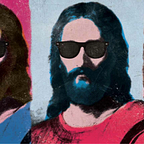‘This is Heaven, What I Truly Want’
Rejection and Conflict in Lana del Rey’s Tropic
David Chidester argues that pop culture is concerned with identity construction and meaning making much as religion is (Klassen, p. 22). Tropico is a conspicuous example of where identity construction and meaning making are tensed between the seeming antipodal impulses of pop culture and religion. While there are signs of a postmodern analysis of contemporary religious life within the production, the language and symbolism of the short film seem to work with a religious criticism of pop cultural life as well. For example, the singer refers to “the garden of evil” and hints that it is actually our world of carnal pleasures.
Upon taking a bite from the apple in the garden, Lana falls and appears in a strip club, one of the more infamous aspects of pop culture in that it incorporates everything antithetical to the world of purity from which human beings are said to have fallen — sex, money, drugs, etc. Yet the conflict comes in by Lana’s seeming preference to have her cake and eat it too: she wants to be both pure and impure. Her desire for purity is seen in her treating her favourite pop culture icons as the gods she worshipped in a state of innocence. Yet she also expresses wanting to take part in the carnal pleasure of the “garden of evil,” Los Angeles. In the sense that this conflict of desire rejects consistency in religious practice, the video itself might be seen to reject the narrative provided by Lana’s Christian background. In this way the video is itself postmodern, which tends to reject metanarratives.
Lana’s rejection of the metanarrative of her Catholic religion contradicts the battle-ready attitude adopted by the American Catholic Church beginning in the 1930s. Her video would have been rejected or heavily censored by that organization, given that the video reveals tacit approval for sexual liberation, permissiveness, and tolerance, signs of modernism which the ACC opposed (McGregor, 2013) and which many religious organizations — Catholic or otherwise — still oppose today. So once again we see that the video is torn between tradition and progress, purity and sin, the sacred and the profane, perhaps reflecting Del Rey’s own process of meaning-making amid a world torn between religion and pop culture.
Works Cited
Klassen, Chris. Religion & Popular Culture: A Cultural Studies Approach. Don Mills: Oxford UP, 2014. Print.
McGregor, Alexander. “Introduction: Catholicism and Cultural Hegemony During the Long 1930s.” In The Catholic Church and Hollywood: Censorship and Morality in 1930s Cinema. 2013. Web.
Tropico. By Lana Del Rey. Dir. Anthony Mandler. Perf. Lana Del Rey. Interscope Records, 2013. YouTube Video.
